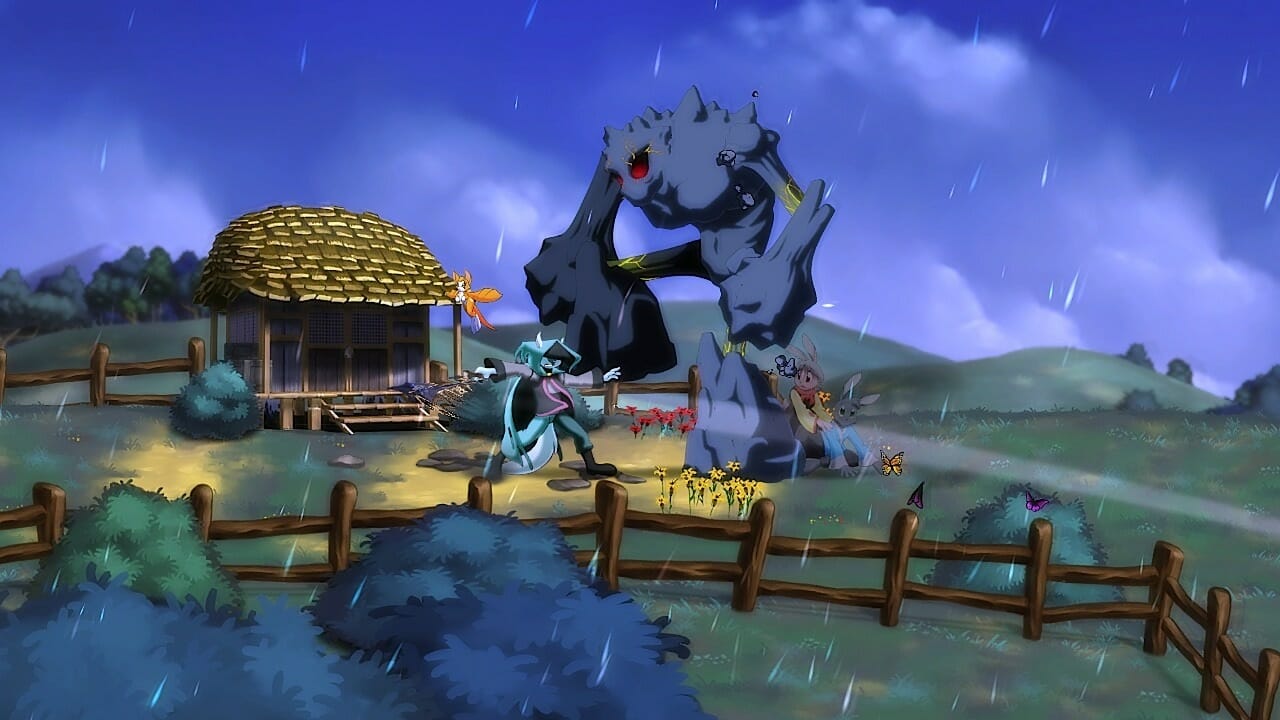
It’s not so much that it’s easy to like Dust: An Elysian Tail as it’s difficult to dislike it. XBLA’s latest 2D action-platformer reminds me of a friend’s Dachshund puppy, Tiger Lily. She was a lovely but clumsy youth who tap danced around tiled corners like a speeding freight truck around Monaco. She so often misbehaved, but her big doe eyes always made her look repentant.
Like Tiger Lily, Dust is too sweet to ever truly annoy. Likewise, however, it ain’t no pedigree.
Although a cursory glance suggests it might be. Dust was hand-painted and hand-animated, and the muted, runny shades of its watercolor environments clash against the loud protagonists of the stage quite gorgeously. There’s an odd roughness to the lead characters Dust, a samurai with turquoise fur, and Fidget, his orange cat-cum-bat sidekick, but nothing that detracts from an always vibrant screen.
A stranger contrast is that of the superficial beauty with a presentation more evocative of a Saturday morning cartoon. It feels like Dust’s amnesic odyssey of self-discovery wants to ape Pixar with a twisting and turning narrative that can mix light adventure, emotional depth and the odd knowing wink. Sadly, the script is hyperactive, switching its tone without pauses for breath, and the end result is messily condensed, more Pokémon than Pixar. The dynamic between Fidget and Dust is somewhat enjoyable, her the exasperated Watson to his jovial Holmes, but her exaggerated squeaks epitomize a narrative trying much too hard to be taken seriously. It’s likeable, but not loveable.
As fellow XBLA title Shadow Complex underlined three summers ago, a Metroidvania game such as Dust needn’t excel at narrative to be excellent. While Dust is undoubtedly as much an ode to secret rooms and progressive upgrades as Shadow Complex was, exploration is one of the game’s two very distinct pillars. The other is the combat, an airborne frenzy of slashes, slams and the elements more in line with a 2D hack-and-slash. It is here that Dust is most lacking, unfortunately.

Dust can deal with enemies either using his sword alone, limited to several two-button combos, or by combining his attacks with Fidget’s elemental magic. The former is direct and swift, but the latter makes each enemy endure up to dozens of hits before dying, ratcheting up a hit meter which adds a very significant XP bonus to each kill. Using Fidget’s fire magic, for example, with Dust’s flying whirlwind attack spawns huge vertical tears of flame that sweep up everything in sight to hundreds of hits. While Dust’s limited energy bar is supposed to keep this in check, in practice it’s easy to spam it. Dust even seems to want me to, offering up an achievement for 1000 consecutive hits along with the XP bonus to buff up Dust’s stats. It’s not quite broken, but the tiresome combat is not fulfilling.
Even though the combat is threadbare in its repetition, it does allow me to swiftly get to the part of Dust I do enjoy: the exploration. While Shadow Complex was lighter on combat and better for it, Dust distilled to its exploration is a love letter almost as charming. Upgrades like the slide, double jump and more are obvious in their roots, but implemented with the kind of precise nous that encourages exploring twice and thrice over. Much like Super Meat Boy, a particular joy is rescuing the cavalcade of indie characters hidden deep within Dust’s forests and caves. I think I’ll never get bored of indie developers sharing their characters across each other’s games.
One significant notch in Dust’s belt would be how it intertwines the combat and exploration with lighter RPG elements—that is, if the leveling wasn’t so borked because of the unbalanced combat. Nevertheless, scavenging the world to find the blueprints and requisite materials to build the best equipment can be a pleasing distraction, albeit not a significant one. In fact, if Dust’s combat was anywhere near to the standard of its artistic, explorative or role-playing elements then it might be something special.
As it is the poor combat translates at its worst into something tolerable, and at its best into something easily likeable despite the clumsiness. The bad, while bad, is not the kind of bad that sours a game, while the good is good enough to gloss over it. Dust may not be a pedigree, but at least it’s a sweetie.
Dust: An Elysian Tail was developed by Humble Hearts and published by Microsoft Studios. It is available for the Xbox 360 through Xbox Live Arcade.
Sinan Kubba was a London-based freelancer who has written for G4TV, The Escapist, Videogamer.com and other forgiving establishments. Last week he became a full-time staffer with Joystiq.com. He misses the Olympics, but not all of the tourists.